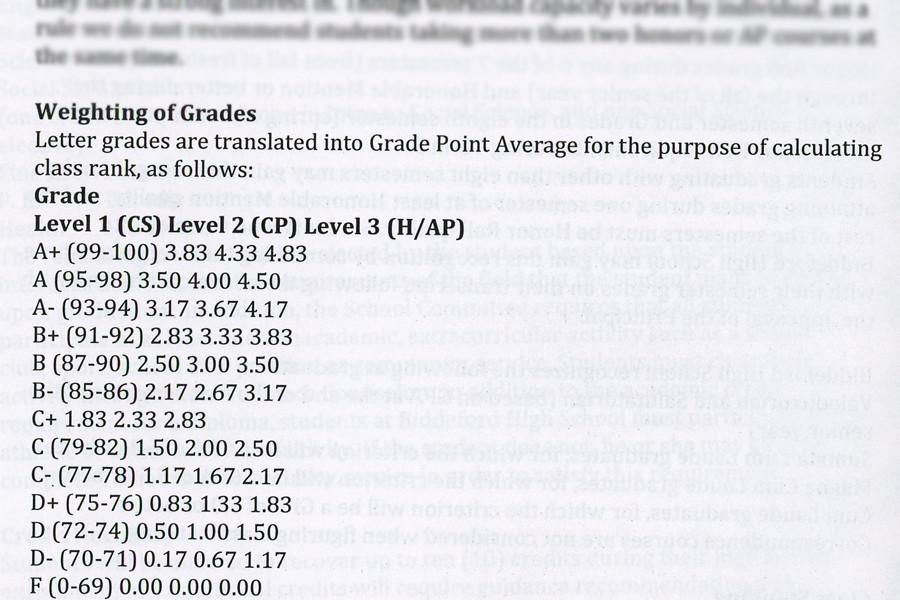Stacked GPAs don’t add up
BHS students and staff look closely at the grading system and some student’s ability to manipulate it.
Apr 9, 2015
In many students’ eyes, their grade point average (GPA) stands for more than just a regular number, rather it signifies hard work, dedication, and in some cases, the ability to use the grading system to their advantage.
Biddeford High School’s grading system is weighted, meaning that different levels of classes are given a different point value, more challenging and advanced classes weighing more than lower level classes. The amount of weight given to these courses, however, may allow students to play the infamous “GPA game.”
Senior Katie Letellier has seen some of her peers take advantage of the grading system, but not in the deliberate way that many think. She thinks, instead, that the content of the classes themselves is to blame.
“I think that it happens, I think in some cases honors and AP classes aren’t all that different from the CP so people take a lot of AP and do very well,” said Letellier. “I guess I’d have to say there’s maybe too much of a difference in weight between AP and CP courses.”
Therefore, Letellier believes that because some AP and honors classes are not that much different from CP classes in terms of workload, students can then take those more heavily weighted courses and get a good grade, boosting their GPA.
“I don’t think anyone purposely takes advantage of the grading system but I think AP and CP have developed similar standards over the years and that makes it difficult to determine an accurate GPA,” Letellier said.
Other students like senior Sean Black see things differently, as he has seen students deliberately take easier classes to boost their GPA.
“I think some students do try to take advantage of the grading system, for example by taking AP or honors classes taught by teachers known to grade easily and taking CP classes in harder subjects where they know they will do just as well in a CP class with less effort than the AP class,” Black said.
Contrary to Letellier, Black suggests that in light of the difficult nature of higher level courses, honors and AP classes should be given more weight than those of lower levels.
“I don’t think a student should be able to take all CP classes and have as good a GPA as a student [who] gets Bs and As in mostly honors classes,” said Black. “Students who take AP and honors classes should be rewarded for challenging themselves with a slightly higher weighted GPA.”
History teacher Ryan Minzy disagrees; in fact, his view of the situation is that there is no way around the problem.
“Don’t get me wrong, I know students are gaming the system, all said and done I’m not sure we’ll ever get it right,” said Minzy. “For the most part it’s eighty percent right…you’re never going to get one hundred percent right, but eighty percent is not bad.”
Minzy also does not think that anything can be done to the grading system itself to improve upon the issue.
“I don’t know that if we increase the incentives for harder courses you’re really going to see a huge improvement, because I think it’s the same people that are going to do it no matter what,” Minzy said.
Minzy instead has an idea that might stop students from taking advantage of the system, a proposal that he called unpopular.
“I think it would be nice if teachers could just say ‘no, you’re not going to take this course; if you’re going to take World History, you’re going to have to take AP,’” said Minzy. “Students are acting according to their short term best interest, while teachers…are better at long term best interest.”
Regardless of how he would like to fix the system, Minzy believes that some students who choose to manipulate the grading system are coming from a more noble mindset than many think.
“To some extent, I get that students are coming from the right place when they purposefully make that mistake,” said Minzy. “In some ways, it’s wrong, but in some ways there’s some right somewhere in that motivation.”
This is because Minzy sees the student’s perspective, in that there is so much pressure on teenagers to be at the top that some are willing to do anything to get there. However he assures that high school should be more about learning and growing and less about class rank and GPA.
“To get better, you have to make some mistakes, but if you make mistakes, you get the B and all of the sudden your GPA drops,” said Minzy. “As a student who’s focused on this, you can’t do that, and I’ve been there, I know that.”
Guidance counselor Jennifer Rowland agrees that GPA should come second to learning, and knows that college admissions can spot the students that boost their GPA without putting the work in.
“I think they can do that for their GPA, but every admission counselor…will question why, if a kid is getting an A+ in a class, aren’t they taking an Honors or AP,” said Rowland. “So yes, that may get them them the higher GPA or the higher ranking, but a college is going to question why they didn’t challenge themselves.”
College aside, though, Black still feels that this is a huge issue at BHS.
“If someone is looking to manipulate the grading system, I don’t think it’s very hard to do.”
Although it may seem easy for students to take advantage of the BHS grading system, the elevated GPA, according to Minzy, will not help the overall student. Additionally, he believes that no matter how you manipulate the system, the results do not accurately represent a students “success.”
“Clearly, ranking number four in your class doesn’t mean as much when you’ve gamed the system…that’s supposed to reflect hard work.”


